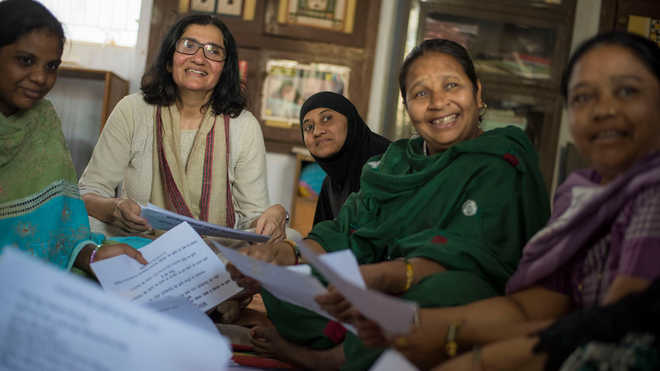
Fighting tooth and nail: Zakia Soman has been spearheading the campaign seeking abolition of the triple talaq for a decade now
Sujoy Dhar
As the Supreme Court’s five-Judge Constitution Bench hears the petition challenging triple talaq, a Muslim woman activist from Ahmedabad keeps her fingers crossed waiting to see a logical legal outcome of her decade-long campaign. Spearheading the campaign to end triple talaq or polygamy in the Muslim society is Zakia Soman, the 50-plus co-founder of the Bharatiya Muslim Mahila Andolan (BMMA). She founded the organisation a decade back, along with Mumbai-based Noorjehan Safia Niaz. While the petitioner in the case is 36-year-old Shayara Bano, it is Zakia’s association, which nourishes the campaign to see the discontinuance of triple talaq. Excerpts from an interview:
Triple talaq petition is now being heard in the court. What alternative do you suggest if it is abolished?
We want the use of ‘talaq-e-ahsan’ method, under which at least four attempts at reconciliation are made before a divorce is granted. A comprehensive reform in Muslim laws is required. The Koran had given us rights 1,400 years ago but we have not been able to savour it. In 2014, we at the BMMA drafted the Muslim Personal Law, drawn from the Koran but from a woman’s perspective.
The BMMA has been surveying Muslim women on the issue for a long time now. What have been your findings?
We have a report which carries case studies of 117 Muslim women who have been victims of “triple talaq”. We got the cases from all over India — Rajasthan, Maharashtra, Madhya Pradesh, Tamil Nadu, Odisha, West Bengal and Karnataka. The report has revealed that 92.1 per cent of Muslim women want this biased system of verbal triple talaq to be abolished.
What do you think about resistance by the All-India Muslim Personal Law Board (AIMPLB) on the issue?
The AIMPLB has been crying conspiracy but it needs to understand that it is denying us our rights mentioned in the Koran. The board cannot be the custodian of the Muslim community in India on its own. The mindset of board members represents a deep-rooted patriarchy. They only reinforce stereotypes of the Muslim community in a regressive way.
What is the way ahead?
Widespread social reforms are needed in the Muslim society. Only religious and males voices can be heard so far. An assessment of programmes for the empowerment of religious minorities in India reveals that Muslim women remain largely invisible in the overall policy framework.
How do you define the movement of BMMA?
We are a progressive voice of the Muslim women challenging patriarchy.
Made of grit
Over the past one decade, Zakia Soman has carved out an identity for herself as a Muslim woman with a voice that has been challenging patriarchy. This 52-year-old Ahmedabad resident, who by profession was a professor of Business Communication at the Gujarat university, now hogs the limelight for the triple talaq campaign. Her fight has now reached the precincts of the Supreme Court for a conclusive judgment. She has been championing the cause of women
— Muslim as well as non-Muslims
— for many years now.
Herself a victim of the triple talaq practice (she was divorced by her “abusive” husband in 2002), Soman is confident that they would win the battle over annulment of triple talaq. And that confidence, perhaps, comes from their victory last year over the entry of women in the famous Haji Ali shrine of Mumbai. The Supreme Court ruling in their favour, allowed women to enter the sanctum sanctorum of the shrine. In 2007, Zakia Soman co-founded the Bharatiya Muslim Mahila Andolan to fight for the citizenship rights of Muslim women. It now boasts of more than 70,000 members. They also supported Hindu women’s movement to demand entry into religious places like the Shani Shingnapur temple in Maharashtra and Sabarimala temple in Kerala. Zakia has edited a book on Dalit Muslims. She has also penned two books. She received the Outstanding Women Achiever’s Award constituted by the National Commission for Women in 2014.



























